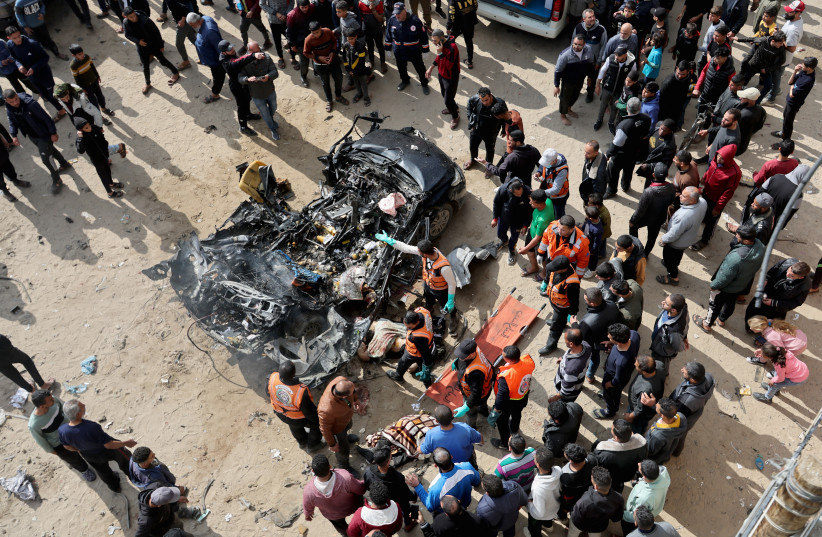After more than four months of war triggered by the October 7 Hamas massacre in southern Israel, it’s all come down to Rafah.
Since Israel invaded Gaza, more than 200 soldiers have died, the IDF has killed over 8,000 Hamas members, according to their assessment, and another 15,000-20,000 Palestinian civilians have been killed, according to Hamas estimates.
However, the twin goals of eliminating the Hamas leadership and securing the release of the remaining hostages who were kidnapped on October 7 have not been achieved.
A move that could lead to a humanitarian disaster
Depending on who is talking, taking on the last Hamas stronghold in Gaza will end the war or create the ultimate humanitarian disaster. Perhaps both simultaneously.
Most of the Gazans who have fled their homes in the North have made their way to Rafah, the place where the IDF directed them to seek refuge. Now, if the IDF is to invade, those refugees, along with the 17,000-odd residents of the city, will again have to flee.

According to Prime Minister Benjamin Netanyahu, a military operation in Rafah is vital to attaining those elusive yardsticks.
“Those who say that under no circumstances should we enter Rafah are basically saying lose the war, keep Hamas there,” Netanyahu told the ABC network over the weekend.
”We’re going to get the remaining Hamas terrorist battalions in Rafah, which is the last bastion, but we’re going to do it, and in this, I agree with the Americans, while providing safe passage for the civilian population so they can leave.
“This is part of our war effort to get civilians out of harm’s way; it’s part of Hamas’s effort to keep them in harm’s way,” Netanyahu noted.
Hamas has warned that any Israeli ground offensive in Rafah on the Gaza border will “blow up” the hostage exchange negotiations,” according to the Hamas-run Aqsa Television channel, which quoted a senior Hamas leader as saying on Sunday.
Also pushing against a Rafah offensive are Israel’s allies in the US and EU, who all cite the huge Gaza population sheltering in the area.
United States Ambassador to the UN Linda Thomas-Greenfield told National Public Radio on Saturday night that “we have been absolutely clear that under the current circumstances in Rafah, a military operation now in that area cannot proceed.
For those who think that Netanyahu, for his own personal survival needs, is intent on continuing the war for as long as possible, the idea of keeping the heat on Hamas in Rafah is also endorsed by Defense Minister Yoav Gallant, not known as being a big fan of the prime minister.
“The more we deepen our operations, the closer we get to a realistic deal in order to return the hostages,” Gallant said on Sunday.
An extensive military operation will likely bring Hamas to its knees, something the country has stated as its objective since October 7. And if you believe the IDF and Gallant, the tactic of increasing pressure on Hamas enabled the November release of hostages and will secure an agreement to free the rest.
On the other hand, can Israel go at it alone, against the wishes of its closest friend, the United States, and its empathetic president, Joe Biden, who made a special trip to Israel after October 7?
Should Israel hold off on the Rafah assault?
The frantic calls to hold off a Rafah assault assume that Israel is going to start bombing and destroying the area with the more than a million Gazans still in the area. Netanyahu stated that a plan to evacuate them is in the works.
Stymying that plan is Egypt’s bellicose warning that those fleeing will not be allowed across the border. Cairo has even gone so far as to say that it would have to rethink its peace treaty with Israel if it goes through with the offensive.
The Rafah showdown is the culmination of the Gaza war, and what transpires in the coming days will determine the outcome of the war and the fate of the hostages.
Unfortunately, if anyone else – Yair Lapid, Benny Gantz, even Israel Katz – were the prime minister, the decision to launch a Rafah military operation would be taken at face value as a reasoned action implemented for the right reasons.
With Netanyahu, it’s a loaded issue, and one that will be used by Israel’s enemies – and erstwhile friends – to show that his ulterior motives of staving off an investigation that will lead to his downfall was the engine that fueled all decisions to keep the war going and give in to Hamas’s demands for a ceasefire.
But he is the prime minister. And ultimately, he must do what will bring the hostages home and prevent Hamas from having the capabilities to attempt another genocidal attack on Israel. If that means worsening the humanitarian crisis in Gaza or antagonizing our few friends in the world, so be it.
Both the humanitarian and diplomatic issues need to be considered, but they can’t be the tipping points in policy-making.
Maybe the threat of Rafah devastation will prompt an 11th-hour decision by Hamas to agree to realistic terms for a hostage release and temporary cease-fire, But based on their utter disregard for the welfare of the Gazan people until now, that's unlikely.
We’ve thought all this time that Hamas was only holding captive those poor souls whom they brutally yanked out of their lives on October 7. It turns out, however, that they took the whole country hostage.
Will Rafah provide the opportunity to break for freedom?
